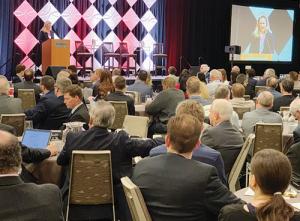CAMPUT 2019
Steve Mitnick is President of Lines Up, Inc., Editor-in-Chief of Public Utilities Fortnightly, and author of “Lines Down: How We Pay, Use, Value Grid Electricity Amid the Storm.”
In chilly Calgary, in May, CAMPUT had its annual conference. CAMPUT was the acronym for the Canadian Association of Members of Public Utility Tribunals. But nobody wanted to say that long name anymore. And the word Tribunals is kinda old-fashioned. So they changed the name of Canada's NARUC to Canada's Energy and Utility Regulators but loyally stuck with the original acronym.

Two of us from the PUF team were there for the regulatory rodeo. As were six American commissioners and NARUC's exec director. This continues the tradition of CAMPUT and NARUC meeting frequently to share ideas on the regulation of utilities.
PUF interviewed regulators of nine of the ten provinces of Canada: Alberta, British Columbia, Manitoba, New Brunswick, Nova Scotia, Ontario, Prince Edward Island, Quebec, and Saskatchewan. And of the FERC-like National Energy Board. And of the vast northern territory Nunavut, the frozen home of Inuit villages that reaches to the North Pole.
Check out the interviews of the eastern and midwestern Canadian regulators here in August's Public Utilities Fortnightly, below. And look back to July's PUF for interviews of the western and northern regulators: Chair Mark Kolesar, Commissioner Kristi Sebalj and Kristjana Kellgren, Alberta Utilities Commission, Chair David Morton and Commissioner Anna Fung, British Columbia Utilities Commission, Commissioner Graham Lock, Nunavut Utility Rates Review Council, Board Member Duane Hayunga, Saskatchewan Rate Review Panel. And with CAMPUT Chair Louis Legault, Director, Legal Services, Régie de l'energie, NARUC Executive Director Greg White, who was also on-hand at CAMPUT 2019.
The similarities between American and Canadian regulators are fascinating and the differences even more so. In some provinces, Canadians regulate the price of gasoline, the opening of gasoline stations, and purchases of farmland and shorefront property. In many, they regulate public power utilities about as extensively as investor-owned utilities.
Resilience against extreme weather, wildfires, and cyber-attacks? Distributed energy? Grid and pipeline modernization? They're big regulatory and policy issues on both sides of
the border.
Conversations with eastern and midwestern Canadian regulators:
- Executive Director Darren Christle, Manitoba Public Utilities Board
- Member Patrick Ervin, New Brunswick Energy and Utilities Board
- Chair Peter Gurnham and Jocelyn Fraser, Nova Scotia Utility & Review Board
- Christine Long, Ted Antonopoulos and Brian Hewson, Ontario Energy Board
- Chair Scott MacKenzie, Prince Edward Island Regulatory & Appeals Commission
- Jean-Denis Charlebois, National Energy Board


